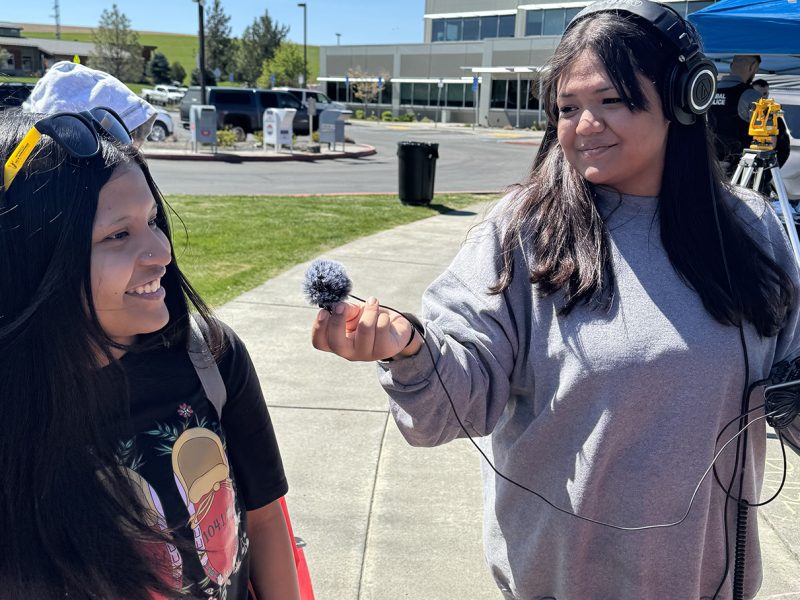While the federal government didn’t agree to dismantle any of the controversial dams in the basin, it will ensure that a framework is in place to replace resources – like irrigation water, power and transportation – provided by the current dam system should Congress authorize dam breaching.
By CHRIS AADLAND, Reporter
Columbia River Basin tribes are celebrating an agreement with the federal government announced on Thursday – a pledge to spend hundreds of millions to help depleted salmon populations recover and to plan the potential breaching of dams in the basin.
The plan, “The Columbia Basin Restoration Initiative” is the result of a mediation process stemming from a long-running lawsuit that claimed that the operation of the four dams on the lower Snake River violated the Endangered Species Act and tribal treaty fish harvest rights.
It is also the latest commitment – amid what many tribes, including the Confederated Tribes of the Umatilla Indian Reservation (CTUIR), have described as a crisis that could soon lead to the extinction of culturally, spiritually, and economically important fish species – the federal government has made to tribes to partner with, and prioritize, recovery efforts.
While the federal government didn’t agree to dismantle any of the controversial dams in the basin, it will ensure that a framework is in place to replace resources – like irrigation water, power and transportation – provided by the current dam system should Congress authorize dam breaching, an idea critics warned on Thursday that could have drastic consequences for the region’s residents.
The agreement was negotiated by the federal government and Six Sovereigns – the CTUIR, the Yakama Nation, the Confederated Tribes of the Warm Springs Reservation, the Nez Perce and the states of Oregon and Washington.
“The Confederated Tribes of the Umatilla Indian Reservation is very appreciative of the collaboration with the Six Sovereigns and our federal partners, and looks forward to working together to advance the goals of healthy and abundant salmon for the benefit of current and future generations,” said CTUIR Board of Trustees member Corinne Sams, in the Dec. 15 White House announcement of the agreement.
Sams, who is also the CTUIR Fish & Wildlife Commission chair and chair of the Columbia River Intertribal Fish Commission, said in her statement, the plan “addresses goals for healthy, abundant population of fish to support tribal treaty and non-tribal harvest” while also ensuring that other considerations, like climate change, the regions energy and transportation needs, and recreational opportunities are factored in any future changes.
Under the agreement, the government will invest $300 million – bringing the total the administration of President Joe Biden has promised for initiatives to help salmon populations recover to more than $1 billion – over the next 10 years. During that time, the litigation that led to the plan will be paused.
The money will be used to improve hatchery operations in the regions, with $100 million going directly to the Six Sovereigns to advance restoration efforts.
The mediation process also resulted in a compromise on how the dams are operated, and how much water is spilled and when, to help salmon runs.
The government also committed to support the development of at least one to three gigawatts of tribal clean energy projects that could offset power losses from the potential breaching of dams. In addition, the White House said the federal government would conduct, or pay for, studies that would further determine how the services provided by the four lower Snake River dams could be replaced.
Conservations groups, including those involved in the lawsuit, and other groups – including some who advocate for irrigators – also cheered the plan, saying it was a major step in helping endangered salmon and steelhead populations recover from drastic declines and in providing a pathway for future dam breaching and ensuring it that wouldn’t harm others who count on the basin’s water and energy.
Still, some – like advocacy organizations that represent energy utility companies, farmers, and other interests, like shipping and transportation, that rely on the current dam system – have opposed any plans that could lead to dam breaching.
Critics have argued it is not the Columbia River Basin’s dams – as tribes have said for years and as government scientists have recently concluded in high-profile studies – but a warming and acidifying ocean that is to blame for salmon population declines. They’ve also said the loss of the cheap, reliable and renewable power generated by the dams couldn’t be easily replaced and dismantling the basin’s dams would have other negative effects for industries that rely on its system of dams.
A group of Republicans who represent Pacific Northwest districts in Congress leaked a draft of the agreement in November, saying the mediation process was unfairly secretive and excluded input from some industries who rely on the river basin and the energy, transportation and irrigation systems created by its dams.
Opponents also had an opportunity to criticize the outcome of the mediation process during a Dec. 13 Congressional hearing, led by Rep. Cliff Bentz, R-OR, who earlier this month called the plan a “destructive, politicized, unfair, and deceptive scheme to ultimately remove the four lower Snake River dams.”
One of those groups opposed to dam breaching, Northwest RiverPartners, recently said the agreement handed “the keys to anti-hydro parties whose state objective is to dismantle the entire system. Another, the Public Power Council, also recently called it “the single greatest threat to the vitality of the region’s hydropower system we have ever faced.”
On Thursday, Dec. 14, that group claimed that rates for Bonneville Power Administration (BPA) energy will go up by at least 40 percent.
“Almost two years of a closed-door process that began with a pro-dam breach agenda from the US Government ended today with, not surprisingly, a blueprint for how to devalue, deplete and ultimately demolish our region’s clean, renewable federal hydro power projects,” Public Power Council CEO and Executive Director Scott Simms said in a press release, adding that government “has now fully shown its cards – turning its back on the citizens, communities and the economy of the Northwest through this so-called agreement with six parties, but no one else.”
The agreement, however, won’t lead to drastic increases in energy costs for those in the region, the federal government said in its Dec. 14 announcement. The BPA estimated an annual average rate increase of 0.7 percent, according to the White House.
It also upholds tribal treaty rights and gives them greater control over restoration work and the future of the Columbia River Basin.
“For generations, the Columbia River Basin ecosystem has served as an integral economic and cultural cornerstone for communities and businesses throughout the Pacific Northwest — especially tribal communities,” U.S. Department of Energy Deputy Secretary David Turk said in the announcement. “Today’s historic agreement reinforces the Biden-Harris Administration commitment to honoring the federal government’s treaty and trust responsibilities to tribal nations and will provide long-term stability and operational reliability so that communities across the region can prosper for generations to come.”
The plan comes after a flurry of federal government commitments and directives to aggressively work to help save salmon populations in the basin and uphold tribal treaty rights, in addition to recent government studies that have concluded that dams were the primary barriers to the recovery of salmon and other species – a plan that has given conservation groups and tribes hope that the region’s dams would someday be demolished and the Columbia River’s salmon would once again thrive.
“We will not allow extinction to be an option for the salmon, nor for us. The United States is bound to salmon and to us by treaty where we reserved all our fisheries,” Nez Perce Tribal Chairman Shannon Wheeler said in the Dec. 14 announcement. “The federal dams on the lower Snake and mainstem Columbia rivers have had – and continue to have – devastating impacts on the salmon and our people, burdening our treaty partnership.”
For the four tribes in the region involved in drafting the agreement, the plan also signaled that the government recognized the dire outlook for salmon and steelhead species – some of which have already gone extinct – and that urgent action, in addition to what tribes and others have already been doing, is needed.
“For too long we have seen the federal government try to do the minimum amount necessary,” Warm Springs Tribal Council Chairman Jonathan Smith, Sr., said in the White House announcement. “This minimum effort approach has resulted in our fish populations limping along at depressed levels, oftentimes near-extinction and leaving us without enough salmon for our ceremonies, culture, and subsistence. We are optimistic that this first of its kind Presidential Memorandum on the Columbia Basin will chart a new course for the federal government that will lead to true restoration of our fisheries.”



